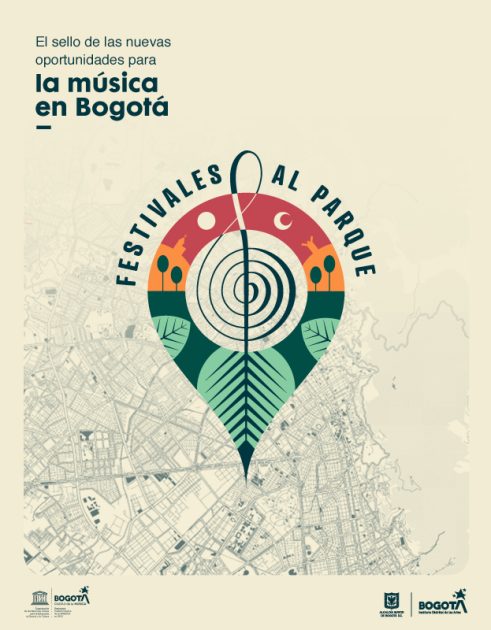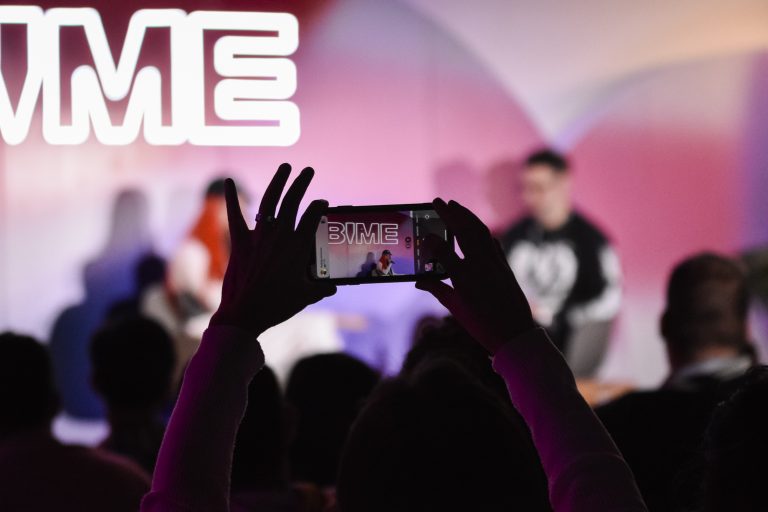
BIME 2024: Our Recap of Bogotá’s Premier Music Industry Showdown
23 May, 2024Our recent visit to BIME Bogotá was charged with anticipation as artists of all walks of life, industry professionals and fans alike gathered to delve into the latest trends and innovations shaping the music landscape in Latin-America and elsewhere. As we navigated through the labyrinthine halls of Bogotá’s Universidad EAN, the feeling of excitement in the air was quite evident. Here’s a brief recap with a highlights from the panels and showcases we were able to catch at the event:
On the first portion of Day 1, around 10:30am, the access was delayed for artists and press alike upon arrival, and there was a considerable wait to enter the venue. Apparently, this was all because Spanish singer Enrique Bunbury was still in the premises of the university after his opening talk, and they needed to keep some sort of security shield around him, probably because his fanbase in the country is quite staggering.
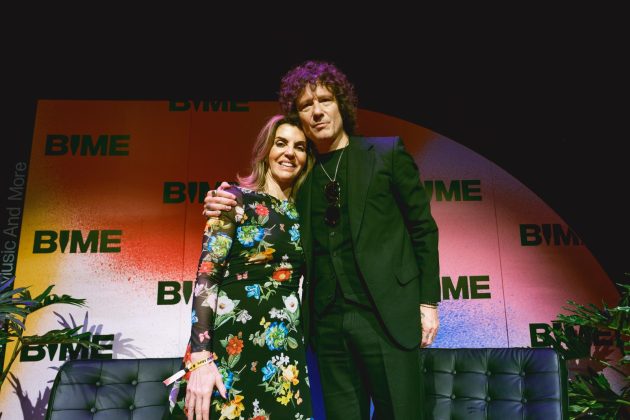
Enrique Bunbury and Leila Cobo during the opening panel
After a brief encounter with Los Dioses del Ritmo, we were finally able to check in at the event. The academic journey kicked off with the thought-provoking panel titled “A un TikTok de la fama” (Just a TikTok Away from Fame), featuring Mexican pop artist León Leiden, music journalist Sara Rojas, Infobae editor Sergio Ramirez, and TikTok Artist & Label Relations Andean Manager Felipe Casalas. One of the key topics discussed at this panel was the TikTok to DSP button, which is an innovative addition to the ‘For You’ feed and streamlines music integration by allowing users to seamlessly transition from discovering a track on TikTok to adding it to their preferred music streaming platform with just a tap. From a user and music fan’s perspective, it’s not hard to envision the profound impact that this could have on music discovery and consumption in the digital age.
However, it was the panel’s discussion on handling TikTok haters that truly captivated our attention. While the artist who asked the question in the Q&A inquired about hater censorship alternatives that the platform offers, and the panelists underscored the importance of self-care and mental health support in navigating online criticism (which are all of course very legitimate and important approaches), there was definitely a missed opportunity to explore strategies for leveraging haters as a form of free publicity, as pointed out in a brilliant line from the sensational hip-hop collective Alcolirykoz song “Pambelé”: “Salven a los haters, son publicidad gratis”/”Save the haters, they’re free publicity.”
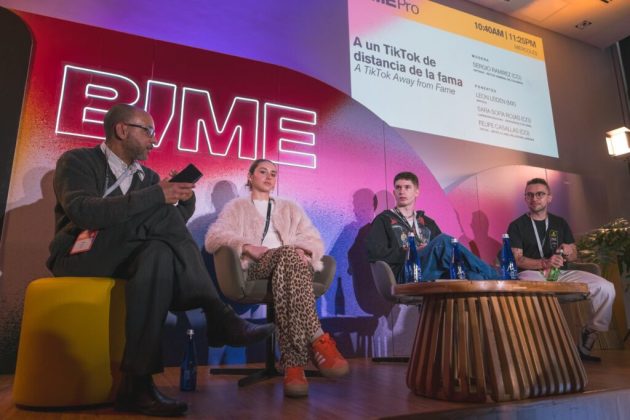
Sergio Ramirez, Infobae Colombia; Sara Sofía Rojas, Lanenamagdalena; León Leiden, artist; and Felipe Casallas, TIKTOK
Nevertheless, this panel was a great opportunity to get a grasp on the current wave that artists and music professionals in the region are currently riding when it comes to the impending TikTokification phenomenon that’s taking over music as a whole.
After spending the rest of the morning browsing the event’s stands and offers, there was one more panel that caught our attention: “Innovación con identidad: cómo encontrar el equilibrio entre la evolución y la autenticidad en los festivales de música” (Innovation with identity: how to find balance between evolution and authenticity in music festivals). This one was also great in the sense that it featured panelists who represented different festival styles and angles. Firstly there was Bogotá’s IDARTES General Manager María Claudia Parias, who revealed a pretty wide stack of data about the “Al Parque” fests, which have evolved from just one festival (Rock al Parque) to a portfolio of nine recurring events along the year.
During the panel it was evident that the foreign speakers, particularly Carol Rodriguez (Proyectos APM Spain) and Christophe Cassan (BIME-Festival Cruilla Barcelona) were quite impressed about the massive impact that this roster of public festivals has had among the cultural ecosystem in Bogotá and elsewhere. On another note, Facundo Cruz (Clix/Dale Play) exposed some interesting viewpoints about the evolution and overall state of music festivals across the planet and his latest venture, Buenos Aires Trap: a festival which is bound to become one of the region’s hallmark music gatherings. In summary, what Cruz mentioned was that the size and line-up of these events is almost irrelevant if they don’t have a solid identity, and a crystal clear avatar of their target audience.
As the event’s second day unfolded, the vibrant energy of the gathering filled the air, with discussions and insights enlightening the path forward in the ever-evolving landscape of Spanish and Latin music. Despite the city’s habitual rainy weather and a few language barriers, the exchange of ideas and experiences flowed seamlessly, emphasizing the universal language of music itself.
The highlight of day 2 for us was undoubtedly the “Estado de la Música Latina” (State of Latin Music) panel, where a select group of key industry leaders shared their perspectives on the current state and future trajectory of Latin music on the world stage. Moderated by Ashley Carman of Bloomberg News, the discussion was funnily enough held in English, and it delved into the meteoric rise of Latin-American artists on the world stage, plus the cultural shifts driving this phenomenon forward.
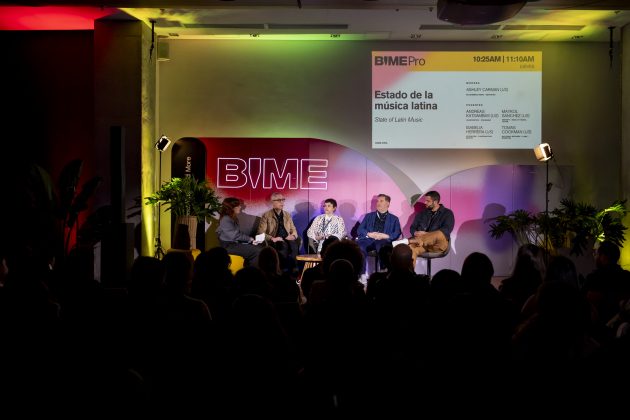
Ashley Carman, Bloomberg News; Andreas Katsambas, Chartmetric; Isabelia Herrera, Pitchfork; Tomás Cookman, Nacional Records/LAMC; Maykol Sánchez, Spotify
Andreas Katsambas, president of Chartmetric, provided valuable insights into the data analytics behind Latin music’s ascent. He firstly mentioned that the Latin-American music market has consistently grown year by year on all major streaming platforms for the last 14 years. Particularly he spoke about the case for countries like Mexico, Puerto Rico and Colombia, which have firmly established themselves among the top 10 or 20 worldwide, not only in traditional streaming platforms but also in other realms such as TikTok and Shazam. With Latin-American artists consistently climbing the ranks on major streaming platforms, Katsambas emphasized the importance of sustaining momentum and innovation to avoid stagnation in the growth of emerging local scenes. He also highlighted the pivotal role of Latin audiences, whose festive spirit has propelled the genre to international prominence.
Maykol Sánchez, Head of Music at Spotify Latam, echoed Katsambas’ sentiments, stressing the significance of authenticity in Latin music projects. Drawing from his previous experience at iconic salsa and tropical music label Fania Records, Sánchez underscored the evolution of Latin music from a niche movement to a worldwide phenomenon rooted in authenticity and cultural pride. He also discussed certain parameters used at Spotify to establish the cultural relevance and overall potential of a given project. He emphasised things like the language used by artists on their songs, and how the more an artist’s genuine personality and values are showcased, the higher the chances are that it will gain traction on the platform.
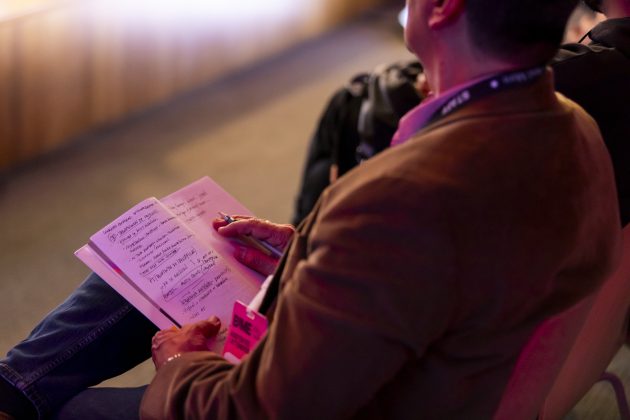
Isabelia Herrera, contributing editor at Pitchfork, shed light on the transformative impact of songs like “Despacito” in reshaping perceptions of Latin music in the U.S. market. She also highlighted the importance of authentic storytelling and overall sonic quality as the ideal driving forces of any succesful music release, citing cuts off of Bad Bunny’s groundbreaking album Un Verano Sin Ti as proof of said originality and cultural relevance. Particularly she mentioned the mini-documentary released for the song “El Apagón”, which deals with the issue of gentrification in Puerto Rico, and the colorful traditional Puerto Rican-influenced performance he did at the 2023 Grammys for “Despues de la Playa”. This specific point was key, because it promotes a direct and horizontal dialogue between the high quality and authentic music that’s being produced in these latitudes, and whatever the traditionally dominating Top 40 North-American and European markets have to offer.
Meanwhile Tomás Cookman, Director at Nacional Records and the Latin Alternative Music Conference (LAMC), highlighted the global reach of Latin artists, and the power of collaborative efforts in amplifying their impact. From Nicola Cruz’s recent 2,000 attendees sold-out show in Poland, to the rise of labels like Rancho Humilde in Mexico, Cookman showcased the diversity and dynamism of Latin music’s expanding footprint. These case studies resonated well with the audience, given the fact that Cruz is a highly respected artist in the alternative Latin niche, not only for his great music, but also for his totally organic approach to marketing and promotion. Also the example of solid teamwork and high performance showcased by Rancho Humilde is worth noting, as this collective has put out some of the freshest acts in the blooming regional Mexican music/corridos tumbados trend, such as Fuerza Régida and Natanael Cano.
As the panel concluded, it was evident that Latin music’s ascent is not just a trend but a cultural movement fueled by authenticity, creativity, and a deep connection to heritage. With each artist and professional contributing their unique voice to the mix, the future of Latin music shines brighter than ever before.
After an afternoon of good vibes and networking at EAN’s plaza amidst web3 startup Spozz’s-sponsored cozy cocktail/gathering, we hit the 440 Music Hall showcase around 11:30pm. The air was filled with salsa choke vibes, courtesy of the subgenre’s main ambassadors, Cali Flow Latino. Though it’s been almost a decade since the project’s breakthrough hit “Ras Tas Tas” was released, the showcase was a very neat and professional compendium of salsa and tropical music standards such as Mon Rivera’s “Lluvia con Nieve”, Los Orientales de Paramonga’s “Danza del Mono”, and also Tito Nieves’ “Fabricando Fantasías”, during which the members of the band, brothers Andrés and Harrison Mesa, did an emotive Mother’s Day special, including a heartfelt tribute to their late mother. During the performance the band also received a golden record award from long-standing national recording house Codiscos, which has been their label since the beginning of their career.
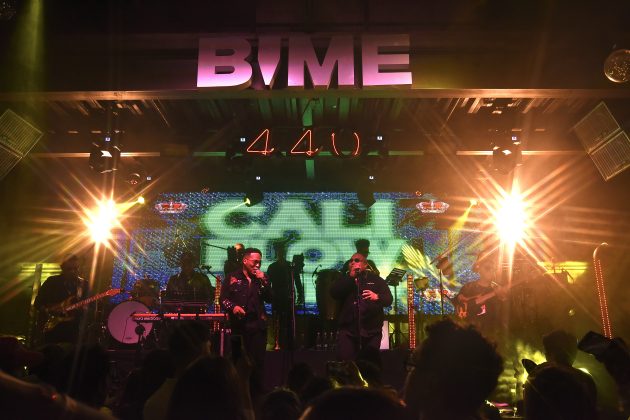
Cali Flow Latino performing at 440 Music Hall
After this memorable set, it was the turn of Los Dioses del Ritmo to take a hold of the stage. As it was natural in this more professional and business-like context, the band opened its set with their undisputed hit “Alo Michael (rico rico rico)”. Besides the infectious energy of LuigyBoy, the brass duet of La Meaya on saxophone and La Florezta on trumpet added up to a performance that nicely portrayed what the group’s Ritmo Exótico outfit is all about. Just like in the case of salsa choke, which according to its pioneers was originally conceived in the Southern Pacific town of Tumaco and then consolidated in Cali, Ritmo Exótico (or simply Exotikeo, as per the official Spotify playlist) is an amalgamation of Quibdó’s very own chirimía, Afro-futurism, hip-hop and more. The short-lived but powerful showcase portrayed the collective’s vibrant presence on stage, and sheer authenticity that has made them one of Colombia’s most promising music projects of the current era, leading them to important stages such as Austin’s South by Southwest Festival earlier this year.
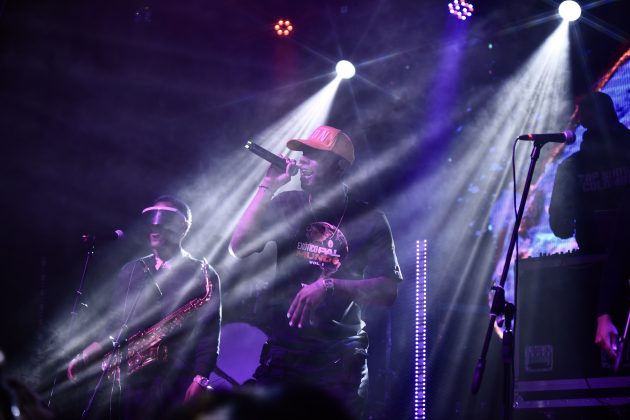
Los Dioses del Ritmo
Venturing into Day 3 of the event felt like stepping into a whirlwind of relentless enthusiasm. Despite the lingering echoes of late-night showcases and spirited parties, the atmosphere remained electric. It was a day that drew together a formidable assembly of the industry’s luminaries and accomplished professionals, all eager to immerse themselves once more in the captivating realm of BIME’s panels and workshops.
Among the day’s standout moments was the riveting panel titled “Building Bridges between Culture, Sustainability, and Creativity”. In an era where sustainability has emerged as a paramount concern across creative landscapes worldwide, this discussion underscored the imperative of collaboration and cross-border networking in fostering sustainability within creative endeavours. Christopher Breedlove, Director of Global Activation at Burning Man Project, lent an international perspective to the discourse, sharing profound insights gleaned from his tenure at one of the globe’s most revered bastions of sustainable, environmentally conscious cultural festivals.
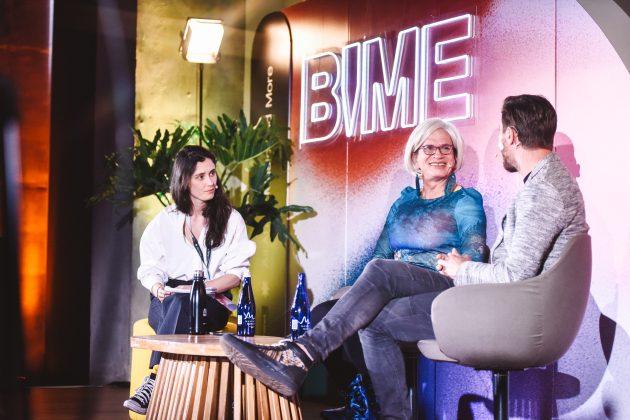
Christopher Breedlove, Burning Man Project; Paula Ráez, Secretaria Asociación de Mujeres en la Industria de la Música; Brigitte Baptiste, Universidad EAN
Equally enlightening was a hands-on workshop led by Federico Carmona, Senior Label Manager at Rimas Entertainment. Carmona’s sage advice and firsthand anecdotes illuminated the intricacies of project management within the creative industries, particularly navigating the challenges of executing large-scale endeavours under tight deadlines. His workshop ignited a fervent spark within attendees, emboldening them to embark on their own creative odysseys right here in Colombia.
As the day unfurled into mesmerizing showcases, one artist emerged as the undisputed star: Gabriela Ponce. Her performance was a masterclass in musical finesse, seamlessly intertwining her prowess as a singer-songwriter with her virtuosity as a clarinetist and her innate sensitivity as a musician. Backed by her exceptional band, Ponce delivered a flawless performance that left audiences spellbound, ensuring her presence would linger in their memories for months to come.
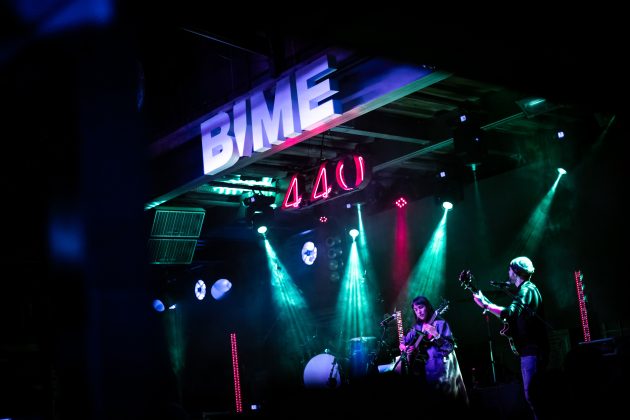
Gabriela Ponce
As the final chords reverberated through the halls of Universidad EAN and the sumptuous venues that hosted the event, it’s clear that BIME Bogotá has consolidated itself as one of the city’s main showdowns for continuous development of the local music industry, and a very relevant platform of cultural exchange. It’s important to keep in mind that there was a parallel circuit of events going on in the city for that week, including Juan Cirerol and Austin TV at La Mecánica, South American alternative powerhouse ZZK Records’ showcase with Los Cotopla Boyz and friends at Disco Jaguar, among several others, so the event’s magic lies not just in the panels or the showcases, but also in the invisible threads of connection it weaves between artists, industry leaders, and fans during this time of year. It’s in the spontaneous conversations over coffee, the anticipation before a performance, and the shared vision of a music industry that is as dynamic and diverse as the sounds that fill its air.
From the groundbreaking insights on TikTok’s influence to the soul-stirring performances of the most promising local acts, BIME Bogotá proved to be a crucible of creativity and collaboration. As we left the event, the echoes of these moments speak of the great potential and unyielding spirit of Latin American music. Here, amidst the rain-soaked streets of Bogotá, the future of music was not just discussed—it was lived, breathed, and celebrated, uniting us in our shared humanity and our quest for the extraordinary.
Follow Sounds and Colours: Facebook / Twitter / Instagram / Mixcloud / Soundcloud / Bandcamp
Subscribe to the Sounds and Colours Newsletter for regular updates, news and competitions bringing the best of Latin American culture direct to your Inbox.


